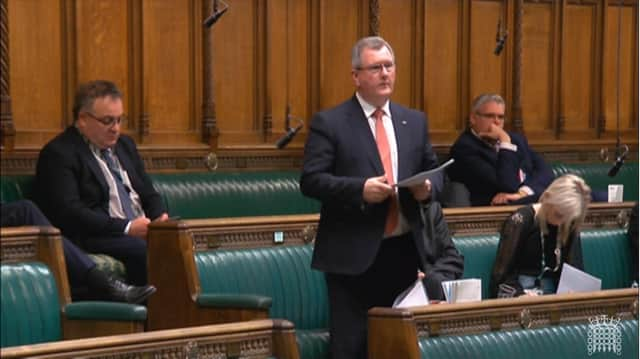Owen Polley: Sir Jeffrey Donaldson should show humility and honesty about the deal's failings, not be arrogant about his critics


Both the House of Commons and the House of Lords debated a ‘humble address’ to His Majesty the King about Northern Ireland’s constitutional status, which gave MPs and peers an opportunity to give their views on the deal.
That motion welcomed the return of devolved institutions in Northern Ireland, reaffirmed ‘the importance of upholding the Belfast Agreement in all its strands’ and acknowledged ‘the foundational importance of the Acts of Union 1800’. But the choice of the ‘humble address’ procedure, which allows parliament to send a message to the sovereign, itself told a story about Safeguarding the Union.
Advertisement
Hide AdAdvertisement
Hide AdThe command paper, that set out the deal, contained a promise that the government would, “provide a mechanism for Parliament to affirm its commitment to the Acts of Union and that there is no basis in the Belfast (Good Friday) Agreement for joint authority arrangements with the government of Ireland”.
It was that pledge that the Commons and Lords were fulfilling, when they endorsed some comforting words intended to make unionists feel better about recent developments.
There’s nothing wrong with the government articulating pro-Union sentiments, or inviting MPs at Westminster to back them in a vote. Too often, ministers have been lukewarm in their support for Northern Ireland’s place in the United Kingdom.
In contrast, this motion stressed the importance of the Belfast Agreement’s three ‘strands’, rejecting the idea that the Republic of Ireland should have a say in our internal affairs.
Advertisement
Hide AdAdvertisement
Hide AdLord Caine, a former special adviser to multiple secretaries of state, said that, “executive power in Northern Ireland shall continue to be vested in His Majesty, and … joint authority is not provided for in the Belfast (Good Friday) Agreement 1998 in respect of the UK and Irish governments”.
It was an important point, even if it has not always been consistently applied.
The problem was that this ‘humble address’, as many MPs and Lords pointed out, was part of the deal but had no legal impact on the constitutional problems created by the protocol.
Indeed, the facts about sovereignty in Northern Ireland played out elsewhere last week, in a judgement at the High Court in Belfast.
Advertisement
Hide AdAdvertisement
Hide AdThe judge there ruled that parts of the recent Legacy Act were not compatible with the Northern Ireland Protocol / Windsor Framework’s provisions on EU human rights law and must therefore be ‘disapplied’.
That decision directly contradicted the Safeguarding the Union paper, which claimed that, “The Windsor Framework applies only in respect of the trade of goods – the vast majority of public policy is entirely untouched by it”.
Indeed, the contrasts between the rhetoric and the reality of this deal have created some stark differences of opinion in the DUP, never mind disagreements with other unionist parties.
In the House of Commons, Sir Jeffrey Donaldson savaged his critics for their supposed ignorance and stupidity in questioning his leadership. He claimed that they did not understand, for example, that the original Acts of Union imposed duties on some Irish goods entering Great Britain.
Advertisement
Hide AdAdvertisement
Hide AdHis former chief whip, Sammy Wilson, disagreed with that assessment, noting that at least, in 1801, the government was responsible for determining our trade laws while now Brussels is in charge of most of our economy.
In the upper chamber, Lord Dodds said that the humble address did nothing at all to undo, “the damage done to our constitutional position … by the protocol”. We are still subjected, he said, to “hundreds upon hundreds of EU laws.”
On X (formerly Twitter), the barrister and Spectator writer, Stephen Barrett, supported that point. He wrote that, “Westminster cannot effectively make laws in Northern Ireland if they contravene the EU.” In response to the High Court judgement, he pointed out that judges here seemed now to have the power to ‘strike down’ parliament’s decisions, meaning that ‘we (the UK) don’t govern there’.
None of these facts are new or surprising. Things like this will continue to surface periodically, as news stories uncover ways in which the Irish Sea border remains a problem for Northern Ireland.
Advertisement
Hide AdAdvertisement
Hide AdOn Thursday, for example, the government issued new advice to businesses in Great Britain for sending parcels to Northern Ireland. Despite the promises in the deal, any packages going to another company will undergo the full rigours of the green or red lane, with all the bureaucracy that involves. Even if an item is being sent straight to a customer, the business must provide a commodity code, which is an extra process not required to send goods to people in Great Britain.
Against that backdrop, rather than show humility and honesty about what he has and hasn’t achieved, Sir Jeffrey has chosen to be high-handed and, frankly, arrogant, in his treatment of unionists who insist on testing his promises against reality. That makes it all the more difficult for his critics to stomach, for example, the gushing media reaction to Michelle O’Neill’s first days as first minister or accept Sir Jeffrey’s contention that all of this is ultimately for the benefit of the Union.
At a DUP meeting last week, then in a BBC interview and a Queen’s University debate alongside Doug Beattie, Sir Jeffrey argued that unionists must ‘make Stormont work’ to persuade uncommitted voters that Northern Ireland’s future lies in the UK.
That may be true. It is, at least, a serious argument. But it does not justify insulting people’s intelligence by pretending that the sea border has disappeared.
That pretence is needed only by the DUP, so that it can claim for purely party political reasons to have achieved something that the facts blatantly do not support.